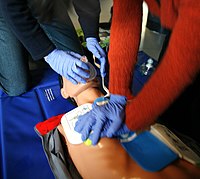
Appropriate height of dental chairs for effective administration of chest compressions by female dentists
Sign Up to like & getrecommendations! Published in 2019 at "Clinical and Experimental Dental Research"
DOI: 10.1002/cre2.236
Abstract: The aim of this study was to determine the appropriate height of a dental chair for the administration of effective chest compressions by female dentists. read more here.
Keywords: height dental; administration; compressions female; appropriate height ... See more keywords

On the Efficacy of Cardio-Pulmonary Resuscitation and Epinephrine Following Cyanide- and H2S Intoxication-Induced Cardiac Asystole
Sign Up to like & getrecommendations! Published in 2018 at "Cardiovascular Toxicology"
DOI: 10.1007/s12012-018-9454-2
Abstract: This study was aimed at determining the efficacy of epinephrine, followed by chest compressions, in producing a return of spontaneous circulation (ROSC) during cyanide (CN)- or hydrogen sulfide (H2S)-induced toxic cardiac pulseless electrical activity (PEA)… read more here.
Keywords: epinephrine; intoxication; pea; efficacy ... See more keywords

The effect of hydraulic bed movement on the quality of chest compressions
Sign Up to like & getrecommendations! Published in 2017 at "American Journal of Emergency Medicine"
DOI: 10.1016/j.ajem.2017.02.042
Abstract: Objectives The hydraulic height control systems of hospital beds provide convenience and shock absorption. However, movements in a hydraulic bed may reduce the effectiveness of chest compressions. This study investigated the effects of hydraulic bed… read more here.
Keywords: compression; quality chest; hydraulic bed; bed movement ... See more keywords

Chest Compressions During Sustained Inflation During Cardiopulmonary Resuscitation in Newborn Infants Translating Evidence From Animal Studies to the Bedside
Sign Up to like & getrecommendations! Published in 2019 at "JACC: Basic to Translational Science"
DOI: 10.1016/j.jacbts.2018.12.004
Abstract: Summary Newborn infants receiving chest compressions in the delivery room have a high incidence of mortality (41%) and short-term neurological morbidity (e.g., 57% hypoxic-ischemic encephalopathy and seizures). Furthermore, infants who have no signs of life… read more here.
Keywords: compressions sustained; cardiopulmonary resuscitation; sustained inflation; newborn infants ... See more keywords

Early, instead of late, automated chest compressions for in-hospital cardiac arrest.
Sign Up to like & getrecommendations! Published in 2017 at "Resuscitation"
DOI: 10.1016/j.resuscitation.2017.01.019
Abstract: The 2015 European Resuscitation Council1 guidelines suggest hat automated chest compression (A-CPR) devices should not outinely replace manual chest compressions. They also suggest hat A-CPR devices are a reasonable alternative to high-quality anual chest compressions… read more here.
Keywords: automated chest; hospital cardiac; high quality; cpr ... See more keywords

Improving quality in measuring time to initiation of CPR during in-hospital resuscitation.
Sign Up to like & getrecommendations! Published in 2017 at "Resuscitation"
DOI: 10.1016/j.resuscitation.2017.06.018
Abstract: OBJECTIVE Time from the onset of "low or no flow" indicators of cardiac failure to initiation of cardiopulmonary resuscitation is an important quality metric thought to improve the likelihood of survival and preservation of end… read more here.
Keywords: initiation chest; time; hospital resuscitation; resuscitation ... See more keywords

Chest compressions induce errors in end-tidal carbon dioxide measurement.
Sign Up to like & getrecommendations! Published in 2020 at "Resuscitation"
DOI: 10.1016/j.resuscitation.2020.05.029
Abstract: BACKGROUND Real-time measurement of end-tidal carbon dioxide (ETCO2) is used as a non-invasive estimate of cardiac output and perfusion during cardiopulmonary resuscitation (CPR). However, capnograms are often distorted by chest compressions (CCs) and this may… read more here.
Keywords: end tidal; tidal carbon; measurement; carbon dioxide ... See more keywords

Haemodynamic impact of chest compressions in the delivery room.
Sign Up to like & getrecommendations! Published in 2022 at "Cardiology in the young"
DOI: 10.1017/s1047951121005217
Abstract: Among 65 neonates with encephalopathy undergoing cooling, 30 (46.1%) received chest compressions during delivery room resuscitation. Despite differences in encephalopathy severity, early ( read more here.
Keywords: chest compressions; haemodynamic impact; delivery room; compressions delivery ... See more keywords

Optimizing CPR Chest Compression in the EMS Environment
Sign Up to like & getrecommendations! Published in 2019 at "Prehospital and Disaster Medicine"
DOI: 10.1017/s1049023x19004862
Abstract: Emergency Medical Services (EMS) systems in many parts of the world transport patients in cardiac arrest while performing manual chest compressions. Other EMS systems have adopted strategies to avoid this procedure. One procedure is the… read more here.
Keywords: cpr; compression; resuscitation; chest compressions ... See more keywords

Quality of chest compressions during pediatric resuscitation with 15:2 and 30:2 compressions-to-ventilation ratio in a simulated scenario
Sign Up to like & getrecommendations! Published in 2020 at "Scientific Reports"
DOI: 10.1038/s41598-020-63921-9
Abstract: The main objetive was to compare 30:2 and 15:2 compression-to-ventilation ratio in two simulated pediatric cardiopulmonary resuscitation (CPR) models with single rescuer. The secondary aim was to analyze the errors or omissions made during resuscitation.… read more here.
Keywords: ventilation ratio; cpr; ratio; resuscitation ... See more keywords

744 Indications for Emergency Department Resuscitative Thoracotomy in Blunt and Penetrating Trauma: A Survey of UK Major Trauma Centre Guidelines
Sign Up to like & getrecommendations! Published in 2022 at "British Journal of Surgery"
DOI: 10.1093/bjs/znac269.209
Abstract: Traumatic Cardiac Arrest (TCA) is a potentially fatal consequence of penetrating or blunt trauma. Emergency-Department Resuscitative Thoracotomy (ED-RT) is the last resort procedure to restore cardiac output following TCA. This study reviews current UK guidelines… read more here.
Keywords: blunt trauma; blunt; trauma; output ... See more keywords